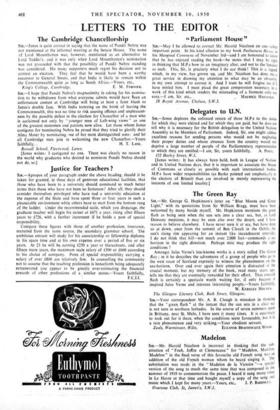Justice for Teachers?
SIR,—Apropos of your paragraph under the above heading, should it be taken for granted, ill these days of generous educational facilities, that those who have been to a university should command so much better terms than those who have not been so fortunate? After all, they should consider themselves privileged who have riad a university education at the expense of the State and have spent three or four years in such a pleasurable environment while others have to start from the bottom rung of the ladder. Under the recommended scale, which you disparage, the graduate teacher will begin his careek at £471 a year, rising after fifteen years to £726, with a further increment if he holds a post of special responsibility.
Compare these figures with those of another profession, insurance, recruited from the same source, the secondary grammar school. The ambitious entrant will study for his associateship or felloviship diploma in his spare time and at his own expense over a period of five or six years. At 23 he will be earning £250 a year or thereabouts, and after fifteen more years, the maximum scale salary of £500 or £600 according to his choice of company. Posts of special responsibility carrying a salary of over £800 are relatively few. In counselling the community not to assume that the teaching profession is henceforth being adequately remunerated you appear to be greatly over-estimating the financial rewards of other professions of a similar status.—Yours faithfully,
F.C.I.I.


















































 Previous page
Previous page